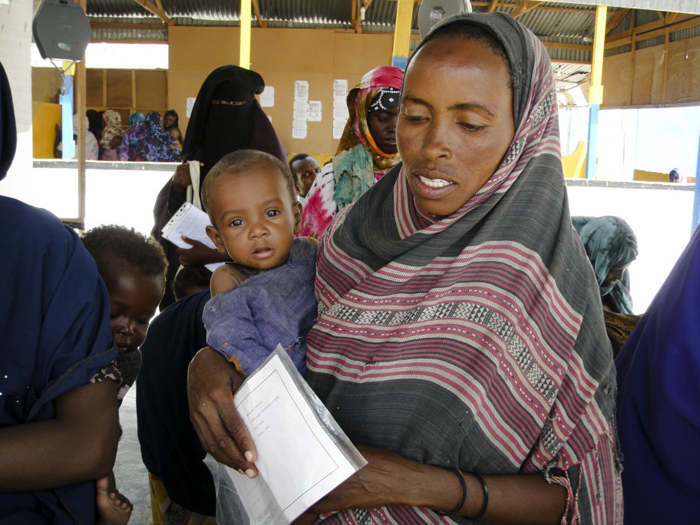MSF Clinics overflowing with malnourished children in Galcayo, Somalia

The number of children under treatment for severe malnutrition has reached an all time high in MSF's nutritional programme in Galcayo, Somalia. More than 1,300 children are now under care in MSF nutritional projects in South Galcayo Hospital and North Galcayo Feeding Centre. That is almost half the total number of children treated for malnutrition in the area in all of 2008.
Fatuma sits beside her severely malnourished child and watches nervously for signs of improvement. Her child is one of more than 1,300 severely malnourished children currently under care in Médecins Sans Frontières (MSF) nutrition programmes in South and North Galcayo, Somalia.
"The situation is alarming," says MSF's Head of Mission for Somalia, Karin Fischer LIDDLE. "This is the highest number of malnourished children MSF has ever treated in the area. What's more, we are concerned that not everyone is able to reach us. What we see in our programme may just be a fraction of a wider crisis."
Sadly, only some of those who need care make it to the MSF facility, which remains the only provider of free medical assistance for hundreds of kilometres around Galcayo. For a long time, insecurity has prevented MSF from running outreach services and transporting patients to and from villages further afield.
"I know many die in the village. The journey is not only long but also expensive and many can't afford it," explains Ubah, another mother whose child who is undergoing intensive therapeutic feeding and treatment for tuberculosis at the MSF facility.
The numbers of women clutching malnourished babies in MSF's packed waiting rooms are increasing. Many have come as a last resort, their sick children having failed to respond to locally purchased remedies and traditional methods of healing.
"In the village there are small pharmacies that sell medicines but there are no prescriptions. If you think it's malaria you ask for malaria tablets. With this medication some recover but others become more ill and die," explains Fatuma.
People arriving at the MSF nutritional programmes discuss how this year's unusually prolonged drought has exacerbated an already tenuous situation; chronic poverty, bad harvests, high food prices and ongoing violence.
"Due to the long drought in the area, the biggest problem we now see is severe acute malnutrition. When the weather is hot we see a lot of patients who travel long distances - some from Ethiopia. These people, their animals are already dead," explains MSF's Therapeutic Feeding Centre Supervisor, Jibril.
Sadly, it is children who are the worst affected, caught in a vicious cycle of disease and malnutrition. "There are many children who are suffering in the village and who are extremely sick," continues Ubah. "My child's illness started with measles and she became very weak. As if this was not enough, she then burnt herself in a fire. After some time she developed blindness and then fell unconscious for eight days. This forced me to bring her to the hospital."
Thanks to MSF's committed Somali staff, who run the organisation's medical programmes throughout Somalia, both Fatuma and Ubah's children are showing steady signs of improvement.
"We have been here for 15 days now. My daughter is still blind, but otherwise fine. They gave her fluid, vitamins and therapeutic food. Now her body is better, unlike when I first brought her here. Now she looks more like other babies," concludes Ubah.
However, countless other children and their families are far less fortunate. "We are extremely limited in our movements due to the heightened insecurity and therefore cannot assess or respond to the medical needs in the wider area," explains Karin Fischer Liddle, "meanwhile, every indicator points toward a horrifying situation, in which countless people, especially children, are suffering silently and without hope of assistance."
MSF runs nutritional programmes in South Galcayo hospital and North Galcayo. South Galcayo hospital is one of the few centres in south-central Somalia to offer surgical care — lifesaving emergency obstetric care and treatment for the many people wounded by violence. From January to October 2009, MSF staff treated 4,803 severely malnourished children, 321 victims of violent trauma and provided 33,700 medical consultations in these facilities. They further delivered 700 babies and vaccinated 6,600 people. In addition, 599 patients were started on treatment for tuberculosis.
MSF runs 10 projects in 8 regions across Somalia, thanks to our committed Somali staff, supported by a remote management teams in Nairobi.





Leave a Comment